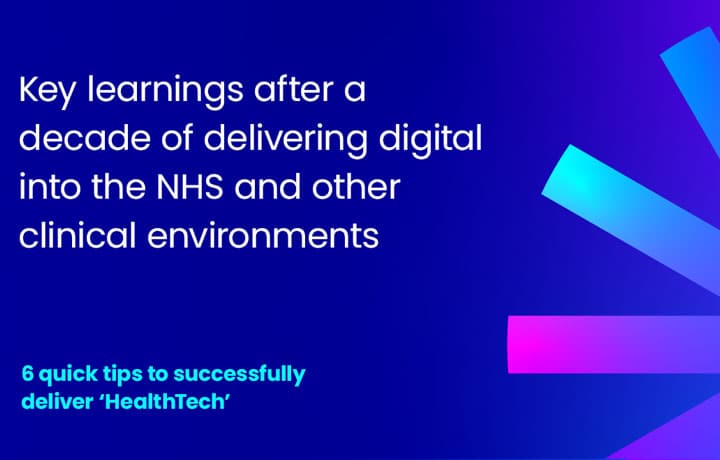6 learnings from delivering digital solutions into the NHS

We have been working with both Private HealthTech companies, as well as directly with NHS Trusts, delivering digital products that transform clincial processes, operational processes and patient expeirence. Below is a summar on our key learnings.
After 18 months of clinical research, another 18 months working as a technical partner alongside the research team and clinicians to bring them, we were finally ready to take the product through clinical trials.
Many HealthTech companies have been here, only to find that the product may never go any further or even worse positive clinical trials still don’t lead to any uptake in the health service.
Like most sectors, the application of simple technologies has huge potential to all parties involved in healthcare delivery – but the NHS is one of the most complex organisations in the world, delivering into a sensitive environment where normally acceptable margins for errors are not acceptable. This makes it a unique environment to deliver digital products and services with it’s own rules for discovery projects, MVP creation and then delivery into healthcare environments.
After 10 years of doing so, with the need for HealthTech becoming ever clearer, we thought now may be the right time to share some of our learnings from delivering into this environment.
1 – Understand the landscape
One of the fundamental mistakes that many entrants to the health tech market make is that the NHS is one uniform buying body. The NHS is one of the most complex organisations in the world and it employs over 1.3 million people.
There are a variety of bodies that make up the NHS such as Clinical Commissioning Groups (CCGs), Primary Care Networks (PCN), Acute (hospital) trusts, Mental health trusts, Community trusts, Ambulance trusts to name a few. In addition, the NHS is currently being restructured with new Integrated Care Systems and Partnerships. There are also national bodies such as NHS England, NHSX, NICE, CQC and NHS Improvement.
Anybody who is trying to create services for the NHS needs to take time to understand the structure and identify the right body, which will procure their product or services.
2 – One successful trial will not necessarily scale your product.
Another common misconception is that a favorable trial in one clinical setting will automatically lead to an uptake in the NHS. One hospital trust vs another will have different priorities based on the local population health requirements. Equally different trusts will have better or worse financial positions. So you need to treat each trust as a new customer.
3 – Disrupting pathways takes time
If your solution involves changes to an existing care path, it is always challenging. It is imperative to have a Clinical Safety Officer (CSO) who can really help to demonstrate that your solution is not just better but also at least matches the safety of the current pathway. Do not underestimate the time it takes to build this body of evidence.
4 – Listen to clinicians and patients
Getting feedback both formal and informal is very important but don’t just rely on the clinical data. Sometimes a solution that saves time or creates efficiencies for a clinician isn’t always appreciated by the patient. You need to be able to balance the two interests and this means surveying how people feel about using new technologies as much as showing the improved clinical results.
5 – Interoperability is here to stay
One of the main issues which have held back better data flow within the NHS has been the lack of interoperability between different systems. This is now a key requirement for all digital development in the NHS. So ensure that your planning does not view your solution in its own stand-alone state but as part of a complex set of systems that all need to talk to each other.
6 – International learnings
The NHS is not the entirety of the HealthTech market. Businesses and innovators sometimes get to the point where they feel that if they can’t sell into the UK, there is no point in looking abroad. However, there are three points to bear in mind.
- i) While there are differences in the process, medical regulation is not that dissimilar, so if you have already jumped through the hoops for UK regulation applying for FDA (or other) approval should not be too daunting.
- ii) A successful trial in an NHS hospital carries a lot of weight in most international healthcare institutions.
iii) The UK Trade and Investment team is a great asset when you are trying to launch into new markets, learn to use them.
Innovation is needed in our health service not least to help deal with the aftermath of the pandemic and the soaring backlog of procedures. If you need any help in building your digital solution please reach out to us.
